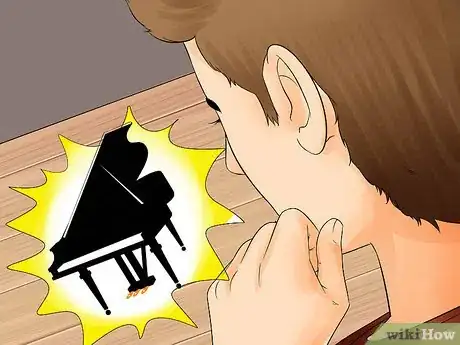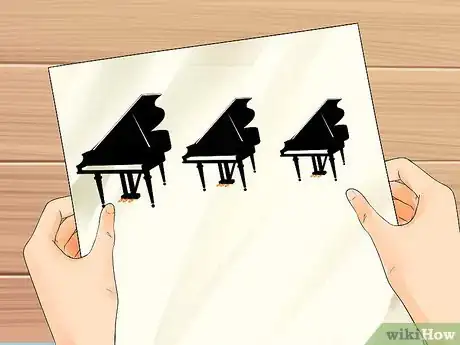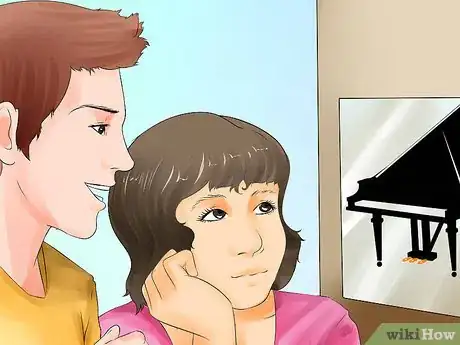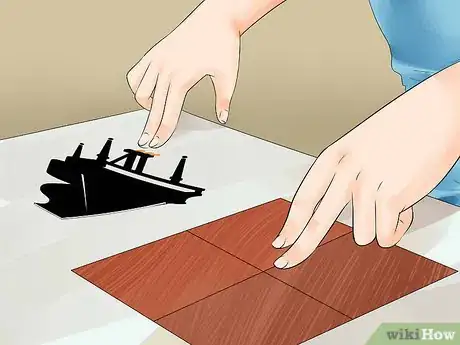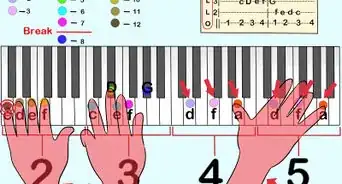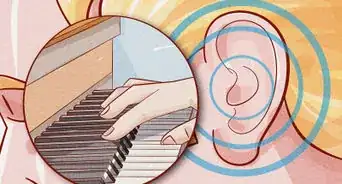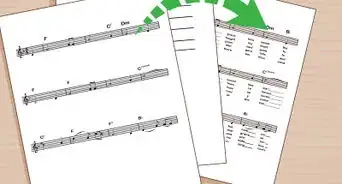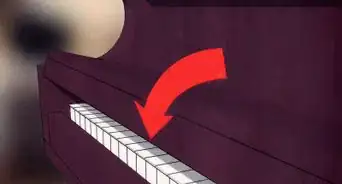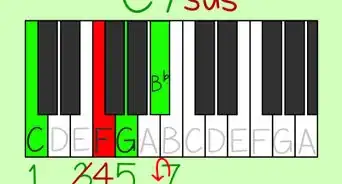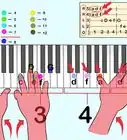This article was co-authored by Michael Noble, PhD. Michael Noble is a professional concert pianist who received his PhD in Piano Performance from the Yale School of Music. He is a previous contemporary music fellow of the Belgian American Educational Foundation and has performed at Carnegie Hall and at other venues across the United States, Europe, and Asia.
This article has been viewed 27,267 times.
Are you considering buying a piano? Be methodical when choosing a piano. You’ll benefit from the time spent later on. Don’t just walk into a piano store and let the salesperson tug at your heartstrings. Pianos are not impulse purchases. Figure out how to choose the right piano for you and how to make a safe purchase below.
Steps
Choosing the Right Piano
-
1Make sure you want a piano and not a digital keyboard. Nothing quite beats the sound of an authentic piano, but many digital keyboards can replicate the sound of a piano, as well as mimic other instruments. They are also lighter and cheaper.[1]
-
2Figure out what size and sound you want in a piano. Size matters when it comes to pianos. The bigger the piano the better it will sound. You hit a key on the piano. It triggers a mallet that strikes a chord in the piano. A bigger piano means that there is more room for the chord to vibrate. More vibration equals richer tone.
- Consider the amount of space you have. There are two kinds of pianos — upright and grand. Uprights save more space than grand pianos. You might not have room for a grand concert piano at home. Uprights come in different sizes and can range from 35” all the way up to 52” tall. Grand pianos are not as tall as uprights, measuring around 36" to 48" tall and up to Fazioli's 10' model.[2]
- Consider how often you move, when determining the size of your piano. Remember that when you move, you’ll have to move the piano too. This can get expensive.
Advertisement -
3Consider who will use the piano. Are you or your children classically trained? Or are you a novice? Some people buy beginner pianos and then upgrade later on. This is a safe bet, because many people lose interest in playing the piano over time.
- If you decide to buy a beginner piano, purchase an upright piano.[3] They are cheaper. They sound great. They save space. In general, they are ideal for people just starting out.
-
4Choose the finish you want. Do you want a wood grain finish or a painted exterior? Figure out which finish you like and how dark or light you want your piano to be. Most people only consider the piano, its size, and its sound quality. They often forget to think about how the piano will look with their other furniture.
-
5Research the different brands of pianos. Every piano company is different. Some feature more contemporary designs, while others retain classical flourishes. Look at examples of each piano design on the manufacturers' websites. This is a good way to get a feel for the prices of most pianos.
-
6Determine a budget. Upright pianos cost between $5,000 and $15,000 on average. Grand pianos normally cost anywhere from $10,000 to $50,000. Of course, these are average prices. You can find pianos at wildly different ends of the price spectrum. Pianos can be pricey to purchase and they also have additional maintenance fees like tuning costs. Expect to tune your piano at least once per year. This can cost between $100 and $350 depending on where you live.
- Set aside an allowance of $250 to $1000 for initial repairs and transportation.
- Consider the climate you live in, and set aside money for keeping your piano in good condition. Pianos are generally made of wood and wire, both of which expand and contract slightly with temperature changes. Climate can affect the frequency of tunings.
- Unlike other big purchases , pianos depreciate in value very little over time if kept in good, working condition. Buying a piano might be a good investment.
Buying a Piano
-
1Visit piano dealers in your area. Be sure to find out whether or not they are registered dealers. You can simply call and ask to find out. Look for deals. Like car lots and department stores, piano dealers have sales and coupons too.
- Ask about warranties. A good piano manufacturer will stand by their product and will offer a warranty. Warranties can help offset the costs for repairs.[4]
-
2Find an expert to help. If you're just beginning your piano shopping experience, bring someone with you who can help you choose a piano with quality sound.
- This is the ideal situation. They will be able to examine the quality of the piano. They can play them to make sure they are in working order. They can also make recommendations on the spot about types of pianos and the materials used in pianos.
-
3Buy from a reputable piano dealer. Doing so ensures both your peace of mind. Bottom line: Find a dealer you trust and who knows their products. You could be buying from someone with little or no in-depth understanding of pianos.
- You may not be able to tell if a dealer is trustworthy, but you can ask questions to help avoid scams. Always ask:
- How long have you owned your business?
- What is your warranty policy?
- Can you provide me with any testimonials?
- Do you have your own repair shop?
- What is your purchase and return policy?
-
4Don’t let the salesperson bully you into a more expensive purchase. Sales associates take a commission of their sales. Remember that pianos are huge investments and take up a lot of space. Don’t burden yourself in either department.
-
5Contact a reputable piano restoration company and ask them to complete an inspection of the instrument before you buy it.
- When you buy a new or used car, it is always a good idea to get a knowledgeable mechanic to inspect it. Pianos are no different. Sometimes, a specialist will recognize a problem that the salesperson failed to mention and you completely missed.
Community Q&A
-
QuestionShould I buy a digital piano or an upright piano?
 Michael Noble, PhDMichael Noble is a professional concert pianist who received his PhD in Piano Performance from the Yale School of Music. He is a previous contemporary music fellow of the Belgian American Educational Foundation and has performed at Carnegie Hall and at other venues across the United States, Europe, and Asia.
Michael Noble, PhDMichael Noble is a professional concert pianist who received his PhD in Piano Performance from the Yale School of Music. He is a previous contemporary music fellow of the Belgian American Educational Foundation and has performed at Carnegie Hall and at other venues across the United States, Europe, and Asia.
Professional Pianist I definitely recommend learning on an acoustic upright piano. But if you can get a really good weighted Clavinova or something like that, they can be very, very similar to an acoustic piano. However, they run anything over $3,000 to $5,000, and honestly, you could buy an acoustic upright for not much more than that, and even less if you look for a used one.
I definitely recommend learning on an acoustic upright piano. But if you can get a really good weighted Clavinova or something like that, they can be very, very similar to an acoustic piano. However, they run anything over $3,000 to $5,000, and honestly, you could buy an acoustic upright for not much more than that, and even less if you look for a used one. -
QuestionHow many keys should I look for?
 Community AnswerThere should be 88. Discount pianos that are missing octaves aren't worth buying.
Community AnswerThere should be 88. Discount pianos that are missing octaves aren't worth buying.
References
- ↑ http://fleap.com/pianoadvice.html
- ↑ http://www.bluebookofpianos.com/types.html
- ↑ Michael Noble, PhD. Professional Pianist. Expert Interview. 25 June 2019.
- ↑ http://msteinert.com/choosing-a-piano/selecting-the-right-piano/
